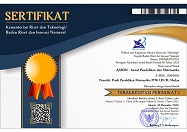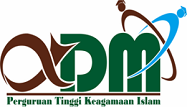Investigation of students' mathematical mindset in solving mathematical literacy problems
Abstract
Mathematical literacy is a crucial competency for university students, yet research indicates that many students struggle to apply it effectively. This study aims to analyze students' mathematical mindsets in addressing mathematical literacy challenges and their implications for mathematics education in higher education. The research employs a descriptive qualitative design, involving three second-semester students selected through purposive sampling. Data collection methods include observation, in-depth interviews, and analysis of mathematical literacy tests, focusing on indicators such as the ability to formulate mathematical situations, apply mathematical concepts and procedures, and interpret mathematical results. Data analysis was conducted through several stages: data reduction, data presentation, drawing conclusions, identifying students' mindsets in solving mathematical problems, and source triangulation. The findings reveal that students' mathematical thinking is influenced by cognitive development, cognitive style, and problem-solving strategies. While some students successfully solve mathematical literacy problems, they still make errors in several concepts and often exhibit carelessness in reading the questions. This research has significant implications for mathematics education in higher education, including the need to emphasize conceptual understanding, balance procedures, and concepts, and utilize visual representations. The development of teaching materials and mathematical literacy questions should be designed to accommodate diverse student mindsets and be grounded in realistic contexts.
Keywords
Full Text:
PDFReferences
Aisyah, A., & Juandi, D. (2022). The description of Indonesian student mathematics literacy in the last decade. International Journal of Trends in Mathematics Education Research, 5(1), 105–110. https://doi.org/10.33122/ijtmer.v5i1.114
Al-Fayez, M.Q. (2023). The level of mathematical writing among child education students. Perspektivy Nauki i Obrazovania, 61(1), 291–305. https://doi.org/10.32744/pse.2023.1.17
Bowen, G.A. (2009). Document analysis as a qualitative research method. Qualitative Research Journal, 9(2), 27–40. https://doi.org/10.3316/QRJ0902027
Cohen, L., Manion, L., & Morrison, K. (2008). Research Methods in Education (8th ed.). Taylor & Francis.
Creswell, J.W., & Creswell, J.D. (2018). Research design: qualitaive, quantitave and mixed methods approches. In SAGE Open (5th ed.). https://dci.org/10.4324/9781315707181-60
Dahliani, D. (2015). Local wisdom in built environment in globalization era. International Journal of Education and Research, 3(6), 157–166.
Dweck, C.S. (2006). The New Psychology of Success. In Random House.
Edwards, B.S., Dubinsky, E., & McDonald, M.A. (2005). Advanced mathematical thinking. Mathematical Thinking and Learning, 7, 15–25. https://doi.org/10.1207/s15327833mtl0701_2
Eriksson, H., & Sumpter, L. (2021). Algebraic and fractional thinking in collective mathematical reasoning. Educational Studies in Mathematics, 108, 473–491. https://doi.org/10.1007/s10649-021-10044-1
Gravemeijer, K., Stephan, M., Julie, C., Lin, F.L., & Ohtani, M. (2017). What mathematics education may prepare students for the society of the future? International Journal of Science and Mathematics Education, 15, 105–123. https://doi.org/10.1007/s10763-017-9814-6
Hakim, L., & Nurlaelah, E. (2018). Mathematical mindsets: the abstraction in mathematical problem solving. Journal of Physics: Conference Series, 1132. https://doi.org/10.1088/1742-6596/1132/1/012048
Handal, B., & Herrington, A. (2003). Mathematics teachers’ beliefs and curriculum reform. Mathematics Education Research Journal, 15(1), 59–69. https://doi.org/doi.org/10.1007/BF03217369
Hapsari, I.P., Saputro, T.V.D., & Sadewo, Y D. (2022). Mathematical literacy profile of elementary shool students in indonesia: a scoping review. Journal of Educational Learning and Innovation (ELIa). https://doi.org/10.46229/elia.v2i2.513
Hignasari, L., Made, G.A., Putri, A., Komang, I., & Wijaya, W. (2023). Transformative strategies in higher education: swot analysis for project-based learning models. Utamax : Journal of Ultimate Research and Trends in Education. https://doi.org/10.31849/utamax.v5i3.15748
Iruntyasari, N., Nuraini, N.L.S., & Mas’ula, S. (2024). Analysis of numeracy literacy skills of grade iv students on geometry materials in elementary schools. IndoMath: Indonesia Mathematics Education, 7(1), 1. https://doi.org/10.30738/indomath.v7i1.81
Kholid, M.N. (2022). What are students’ difficulties in implementing mathematical literacy skills for solving pisa-like problem? Journal of Higher Education Theory and Practice, 22(2), 181–200. https://doi.org/10.33423/jhetp.v22i2.5057
Kirkland, P.K., & McNeil, N.M. (2021). Question design affects students’ sense-making on mathematics word problems. Cognitive Science, 45 4. https://doi.org/10.1111/cogs.12960
Kolar, V.M., & Hodnik, T. (2021). Mathematical literacy from the perspective of solving contextual problems. European Journal of Educational Research, 10(1), 467–483. https://doi.org/10.12973/eu-jer.10.1.467
Lange, J. De. (2006). Mathematical literacy for living from oecd-pisa perspective. Tsukuba Journal of Educational Study in Mathematics, 25(1), 13–35. https://www.criced.tsukuba.ac.jp/math/sympo_2006/lange.pdf
Larmer, J., Mergendoller, J.R., & Boss, S. (2015). Setting the standard for project based learning. In Engineering (Issues 1–2).
Lesh, R., Galbraith, P.L., Haines, C.R., & Hurford, A. (2010). Modeling students’ mathematical modeling competencies.
Lestari, N.D.S. (2019). Integrating mathematical literacy toward mathematics teaching: the pedagogical content knowledge (pck) of prospective math teacher in designing the learning task. In IOP Conference Series: Earth and Environmental Science, 243(1). 1-12. https://doi.org/10.1088/1755-1315/243/1/012131
Lithner, J. (2003). Students’ mathematical reasoning in university textbook exercises. Educational Studies in Mathematics, 52(1), 29–55. https://doi.org/10.1023/A:1023683716659
Maass, K., Geiger, V., Ariza, M.R., & Goos, M. (2019). The role of mathematics in interdisciplinary stem education. ZDM - Mathematics Education, 51(6), 869–884. https://doi.org/10.1007/s11858-019-01100-5
Manah, N.K., Isnarto, I., & Wijayanti, K. (2017). Analysis of mathematical problem solving ability based on student learning stages polya on selective problem solving model. Unnes Journal of Mathematics Education, 6(1), 19–26. https://doi.org/10.15294/ujme.v6i1.10855
Manggala, I.S.A., & Yuniawatika. (2021). Develop students’ mathematical literacy in learning. Advances in Social Science, Education and Humanities Research. https://doi.org/10.2991/assehr.k.211210.044
Maslihah, S. (2020). The role of mathematical literacy to improve high order thinking skills. Journal of Physics: Conference Series, 1539(1), 1-6. https://doi.org/10.1088/1742-6596/1539/1/012085
Melisa, M., & Utami, N.S. (2023). Students' mathematical literacy in solving problems equation of three variabels. Jurnal Pendidikan Matematika (JUPITEK). https://doi.org/10.30598/jupitekvol6iss1pp42-48
Miles, M. ., & Huberman, A. . (2014). Qualitative data analysis: a methods sourcebook (3rd ed.). SAGE.
Morrison, G.R., Ross, S.M., Kalman, H.K., & Kemp, J.E. (2010). Designing effectivite instruction (7th). John Wiley & Sons.
Mulligan, J., & Mitchelmore, M. (2009). Awareness of pattern and structure in early mathematical development. Mathematics Education Research Journal, 21, 33–49. https://doi.org/10.1007/BF03217544
Musaad, F., Trisnawati, N.F., Rusani, I., Sundari, S., & Setyo, A. A. (2023). Pengaruh model problem based learning untuk meningkatkan kemampuan literasi matematika pada materi penyajian data. AXIOM : Jurnal Pendidikan Dan Matematika, 12(2), 218-225. https://doi.org/10.30821/axiom.v12i2.17966
Nugraha, T., & Suparman, S. (2021). Heterogeneity of indonesian primary school students’ mathematical critical thinking skills through problem-based learning: a meta-analysis. Al-Jabar : Jurnal Pendidikan Matematika. https://doi.org/10.24042/ajpm.v12i2.9645
Nurwidiyanto, A., & Zhang, K. (2020). Strategies of pattern generalization for enhancing students' algebraic thinking. Periódico Tchê Química. https://doi.org/10.52571/ptq.v17.n36.2020.187
OECD. (2022a). Pisa 2022 results : the state learning and equity in education: Vol. I (Issue 2).
OECD. (2022b). Pisa 2022 results: learning during and from distruption: Vol. II. OECD Publishing.
Pratama, M.A. (2020). Mathematical critical thinking ability and students’ confidence in mathematical literacy. In Journal of Physics: Conference Series, 1663(1), 1-6. https://doi.org/10.1088/1742-6596/1663/1/012028
Rau, M.A. (2017). Conditions for the effectiveness of multiple visual representations in enhancing stem learning. Educational Psychology Review, 29(4), 717–761. https://doi.org/10.1007/s10648-016-9365-3
Sari, D.P., Aisyah, S., & Zahari, C.L. (2023). Analisis kemampuan literasi matematika siswa dalam menyelesaikan soal pisa ditinjau dari gaya belajar. Jurnal THEOREMS (The Original Research of Mathematics), 7(2), 309-320. https://doi.org/10.31949/th.v7i2.4498
Schoenfeld, A.H. (2016). Learning to think mathematically: problem solving, metacognition, and sense making in mathematics (reprint). Journal of Education, 196(2), 1–38. https://doi.org/10.1177/002205741619600202
Schoenfeld, A.H. (2016). Mathematical thinking and problem solving. Mathematical Thinking and Problem Solving, September. https://doi.org/10.4324/9781315044613
Shen, C., Miele, D., & Vasilyeva, M. (2016). The relation between college students’ academic mindsets and their persistence during math problem solving. Psychology in Russia, 9, 38–56. https://doi.org/10.11621/PIR.2016.0303
Sholihah, U., & Susanti, V.D. (2023). Eliciting activities model on students’ mathematical literacy ability. AKSIOMA: Jurnal Program Studi Pendidikan Matematika, 12(1), 134. https://doi.org/10.24127/ajpm.v12i1.6608
Stephens, M. (2019). Developing algorithmic thinking in mathematics in the primary and junior secondary years. Theory and Practice: An Interface or A Great Divide? https://doi.org/10.37626/ga9783959871129.0.104
Susanti, V.D. (2023). Application of eliciting activities model to improve students’ mathematical literacy ability. In AIP Conference Proceedings, 2614 (1). https://doi.org/10.1063/5.0153561
Thien, L.M., Darmawan, I., & Ong, M.Y. (2015). Affective characteristics and mathematics performance in indonesia, malaysia, and thailand: what can pisa 2012 data tell us? Large-Scale Assessments in Education, 3, 1–16. https://doi.org/10.1186/S40536-015-0013-Z
Wijaya, A., Elmaini, & Doorman, M. (2021). A learning trajectory for probability: a case of game-based learning. Journal on Mathematics Education, 12(1), 1–16. https://doi.org/10.22342/JME.12.1.12836.1-16
DOI: http://dx.doi.org/10.30821/axiom.v13i2.20440
Refbacks
- There are currently no refbacks.
Copyright (c) 2024 Nailul Himmi, Dian Armanto, Izwita Dewi

This work is licensed under a Creative Commons Attribution-ShareAlike 4.0 International License.
p-ISSN: 2087-8249 | e-ISSN: 2580-0450
Indexed by:
AXIOM : Jurnal Pendidikan dan Matematika is licensed under a Creative Commons Attribution-ShareAlike 4.0 International License.











